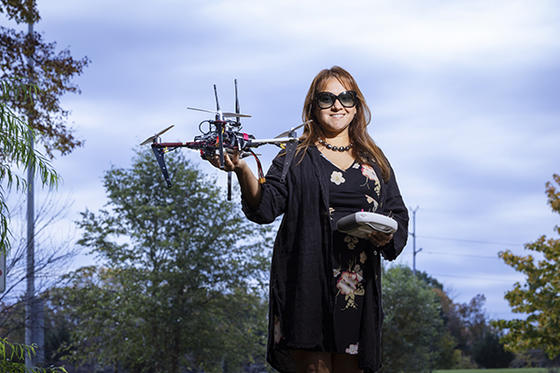Listening to Aliyah Pandolfi, BS Management ‘04, talk about her journey from entrepreneur to anti-poaching advocate, it can be easy to forget another title she holds: princess.

Pandolfi is a descendant of one of the royal families of Kashmir—a Himalayan region occupied by foreign military forces. Her father fled to Pakistan as a child during territorial disputes and later became a Pakistani diplomat in Washington, D.C., after which he moved his family to Northern Virginia. After retirement, he earned his real estate license. Pandolfi recalls going to her father’s office, where her interest in business began.
By 18, she had started her own real estate company. Pandolfi needed her college education to fit around the full-time responsibilities of business ownership—and that’s where her journey intersected with Mason. After she earned an associate’s degree she took advantage of the university’s flexible course offerings and completed her bachelor’s while continuing her career.
Her management degree would eventually lead Pandolfi from independent business owner to an international foundation: the Kashmir World Foundation (KwF). KwF has three arms—Kashmir Academy, Kashmir Robotics, and Kashmir Rose—working toward conservation and endangered species protection through education, technological development, and art, respectively. The foundation specifically focuses on developing drones that support anti-poaching efforts. Previous projects include using drones in the African bush that could identify poachers and share their location with authorities, and drones with the real-time ability to identify sea turtle tracks and geolocate their nests.
Pandolfi is known for thinking of solutions far outside the box. But she views that space of evolution and innovation as precisely where the KwF needs to be. “I want to revolutionize not just what we create, but how we think about autonomous aerial, ground, and marine systems and what they’re capable of,” she says.
That strong belief in the importance of evolution and growth is something she sees reflected in Mason.
“Both Mason and I are so different from when I was a student, but that evolution is necessary,” she says. “Resilience is inherent to being able to grow and flourish, to allow different views to be accepted and applied. I see that resilience in Mason.”
Pandolfi’s daughter, Kashmir, attended the Mason Space Exploration Center Summer Camp at the Fairfax Campus this past summer, continuing the Mason legacy.
“I continue to carry the Mason spirit wherever I go. I want to be defined not by my title, but by my legacy. I want to lead by example and bring people together to solve problems that might seem impossible.”
Read More Alumni Stories
- February 18, 2026
- February 18, 2026
- February 16, 2026
- February 16, 2026
- February 2, 2026
